Non-fungible tokens witnessed explosive growth in 2021, they stabalized in 2022 and the hype, for the most part, has died down today.
According to Chainalysis, the NFT market reached over $40 billion in value in 2021 before stabalizing the following year. Nevertheless, NFTs remain popular among crypto holders. A CoinGecko survey revealed that as many as three of four crypto holders have NFTs in their portfolio.
If you're looking to get your hands on an NFT, you'll have to get it through an NFT marketplace, which have made these digital assets accessible to a global audience.
In this article, we'll highlight the top NFT marketplaces, exploring some of the best NFT marketplaces that are shaping the digital landscape, and discover why they’re the go-to venues for enthusiasts and investors alike.
What Are NFTs?
Non-fungible tokens, or the easier-on-the-tongue “NFTs,” entered the public consciousness when Twitter (now X) co-founder Jack Dorsey sold his first-ever tweet as an NFT for $2.9 million in March 2021. This sale caught everyone's attention and highlighted the potential of NFTs as a new form of digital ownership.
So, what are NFTs exactly?
"Non-fungible" means something unique that can't be replaced by something else of equal value. Think of it like a rare trading card or a unique piece of art. Unlike a Bitcoin or a dollar bill, which are interchangeable with any other Bitcoin or dollar, NFTs represent ownership of a specific digital item. This could be anything from a piece of digital art, a collectible, virtual real estate or an in-game item.
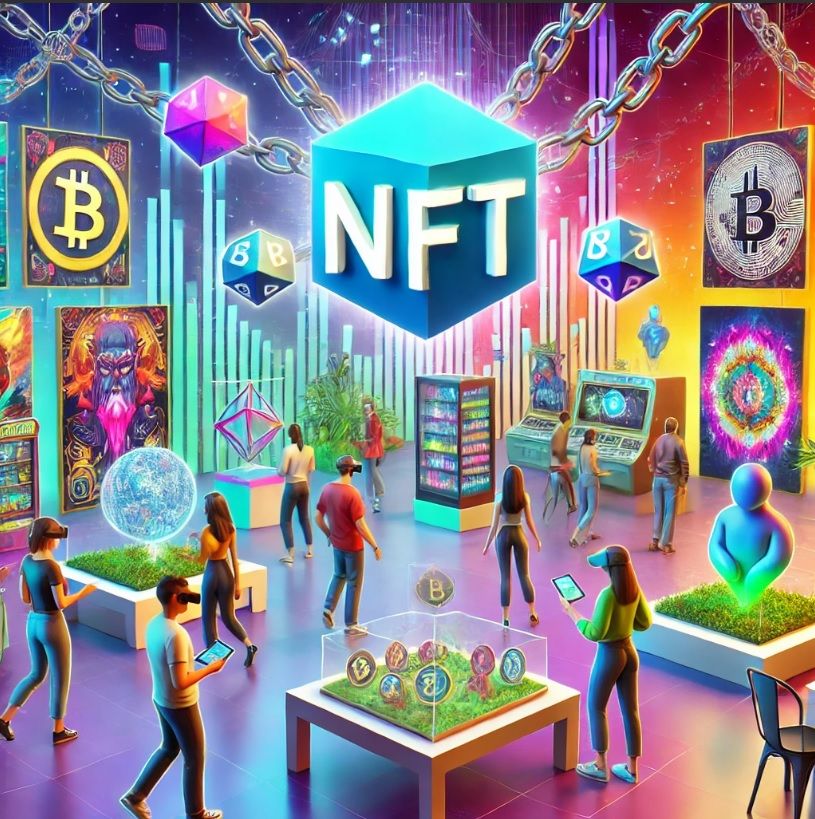 NFTs Represent Ownership of a Specific Digital Item. Image Generated by ChatGPT
NFTs Represent Ownership of a Specific Digital Item. Image Generated by ChatGPTJack Dorsey may have taken NFTs mainstream but the concept had been around since the mid-2010s. CryptoKitties, a blockchain-based game where players could adopt, breed, and trade virtual cats, is credited for pioneering the non-fungible token standard known as ERC-721.
From digital art auctions fetching millions to virtual real estate being sold in online metaverses, NFTs are reshaping the landscape of digital ownership. However, the sector has evolved dramatically. Fast forward to today, and NFTs have expanded far beyond virtual pets. Artists, musicians, and even brands are using NFTs to monetize their work and engage with fans in new ways.
For example, platforms like Alethea.AI are pushing the boundaries by creating NFTs that are more than just static images. It has pioneered the creation of intelligent, interactive NFTs, called iNFTs, by integrating AI with blockchain technology. These iNFTs can learn, adapt, and interact, providing dynamic, immersive experiences.
Here at The Coin Bureau, we have a ton of NFT-related pieces for your perusal:
- Complete Guide to NFTs
- Top NFT Wallets
- How to Avoid NFT Scams
- Use Cases For NFTs Beyond Digital Collectibles
- How to Mint NFTs
- What Are Fractionalised NFTs
Why NFT Marketplaces Matter
NFT marketplaces offer a gateway to a vast, vibrant world where digital assets hold real value. It is a whole ecosystem in itself, where enthusiasts can buy or sell their prized possessions just like there are auctions or selling and buying of our routine items.
NFT marketplaces serve as the primary platforms for buying, selling, and trading non-fungible tokens, ensuring a secure and transparent way to transact. These marketplaces provide the necessary infrastructure and tools for creators to mint and list their NFTs, and for buyers to discover, purchase, and manage their digital collections.
Key features and functions of NFT marketplaces:
- Minting: The process of creating a new NFT and adding it to the blockchain.
- Listing: Allowing creators to put their NFTs up for sale on the marketplace.
- Trading: Facilitating the buying and selling of NFTs between users.
- Royalties: Enabling creators to earn a percentage of each subsequent sale of their NFT.
- Wallets: Providing users with a secure place to store and manage their NFT holdings.
- Discoverability: Offering search and browsing tools to help users find NFTs of interest.
NFT marketplaces provide several benefits that enrich the entire NFT ecosystem. Here's why they are important:
- Increased Liquidity and Accessibility: They facilitate easier buying, selling, and trading of NFTs, allowing creators to monetize efficiently and collectors to acquire valuable assets.
- Promotion of NFT Adoption: User-friendly platforms raise awareness and make NFTs accessible to a broader audience.
- Fuelling Innovation: These marketplaces foster innovation by providing platforms for developers to create new applications, features, and standards.
- Creating Opportunities for Creators and Collectors: They open new monetization avenues for creators and investment opportunities for collectors, fostering a thriving market.
- Democratizing Access to Digital Assets: They enable diverse participation in the digital economy, making ownership and trade of digital assets more inclusive.
How to Choose an NFT Marketplace
Choosing the right NFT marketplace is important for both creators looking to mint and sell their digital works and collectors aiming to build portfolios. With so many platforms available, each offering distinct features and specialties, it’s important to thoroughly assess your options before committing.
Key considerations include the user interface and overall experience, transaction fees and associated costs, security measures, supported cryptocurrencies, and the marketplace's reputation and reliability.
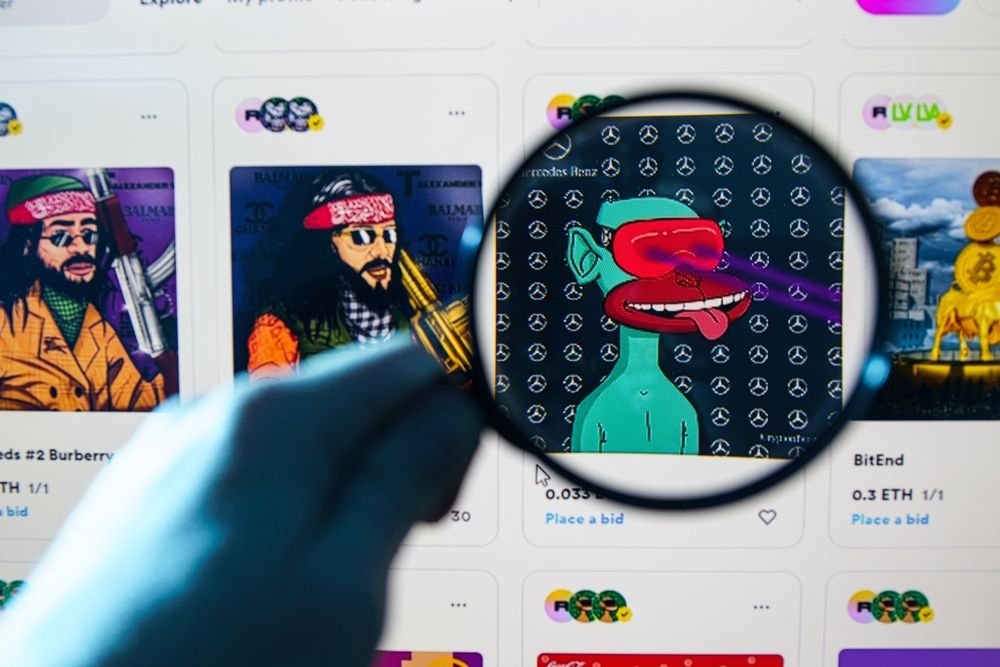 It's Important to Evaluate Options Before Committing. Image via Shutterstock
It's Important to Evaluate Options Before Committing. Image via ShutterstockLet's dive into each of these elements in more detail to help you make an informed decision that aligns with your NFT goals.
User Interface and Experience
The user interface (UI) and user experience (UX) are paramount when it comes to navigating NFT marketplaces. A well-designed platform makes your journey enjoyable and hassle-free.
- Ease of Navigation: A user-friendly interface is essential. Look for clear, intuitive navigation that makes it easy to find and interact with NFTs.
- User-Friendly Design: The platform should be visually appealing and well-organized. Features like parallax animation can enhance the user experience.
- Support and Customer Service: Robust support systems, including FAQs, contact forms, and active community engagement, are vital. This ensures any issues are resolved quickly and effectively.
Transaction Fees and Costs
Understanding the cost implications of using an NFT marketplace can save you money and improve your trading experience. Here's what to look out for:
- Fee Structures and Comparisons: Understand the various fees, such as listing, trading, and royalties. Compare costs across platforms to find the most cost-effective option.
- Impact on Buyers and Sellers: Lower fees can attract more users and increase liquidity. Consider how fees affect both buyers and sellers.
- Ways to Minimize Costs: Look for features like bulk purchasing and aggregated listings to reduce gas fees and other transaction costs.
Security and Trustworthiness
Security is non-negotiable when dealing with digital assets. Ensuring your chosen marketplace is secure and trustworthy is key to protecting your investments.
- Security Measures and Protocols: Ensure the marketplace has robust security measures, such as encryption, secure payment gateways, and regular audits.
- Reputation and Track Record: Research the marketplace’s history and reputation within the NFT community. A strong brand with a reliable track record is crucial.
- User Reviews and Ratings: Check user reviews and ratings to gauge overall user experience and identify any potential issues or concerns.
Supported Cryptocurrencies
The cryptocurrencies supported by a marketplace can affect your ease of use and transaction flexibility. Make sure your preferred currency is accepted.
- Commonly Accepted Cryptocurrencies: Verify which cryptocurrencies the marketplace supports, such as Ethereum, Solana, or Polygon. Ensure it aligns with your preferred payment methods.
- Integration With Wallets: The marketplace should seamlessly integrate with popular cryptocurrency wallets, facilitating easy connection and management of NFT holdings.
- Exchange Options: Consider if the marketplace allows cryptocurrency exchanges or conversions to fiat currency for greater flexibility.
By carefully evaluating these factors, you can identify the NFT marketplace that best suits your needs as a creator, collector, or investor.
Top NFT Marketplaces
Various platforms have emerged as the go-to destinations for buying, selling, and trading digital assets. Let's dive into some of the best NFT marketplaces.
OpenSea
OpenSea is the largest and most comprehensive NFT marketplace, offering a vast array of digital assets, including art, domain names, virtual worlds, and trading cards. Launched in 2017, OpenSea supports multiple blockchains, including Ethereum, Solana, Polygon and Arbitrum.
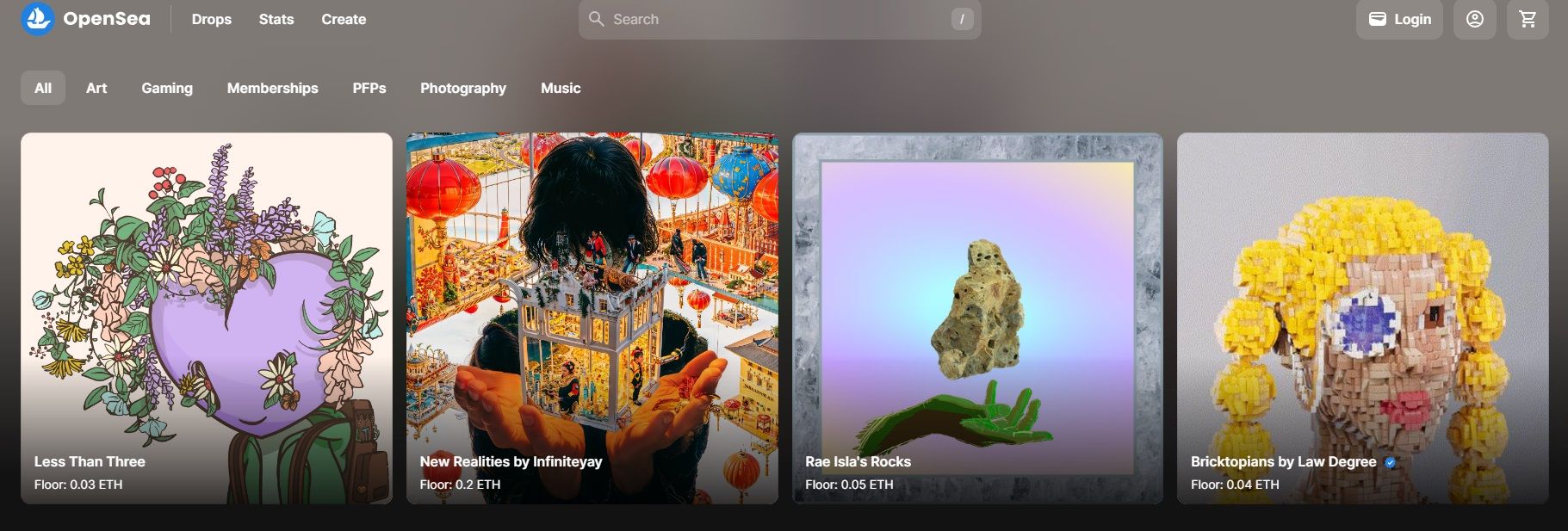 OpenSea Hosts a Diverse Collection of NFTs. Image via OpenSea
OpenSea Hosts a Diverse Collection of NFTs. Image via OpenSeaBlockchain(s): Ethereum, Polygon, Klaytn, Solana, Arbitrum, and more.
Crypto(s) Accepted: The core cryptocurrencies you can use on OpenSea are Ethereum (ETH/WETH), AVAX, USDC, KLAY, and DAI. It supports a few other payment tokens as well.
Fees: OpenSea receives a 2.5% fee on secondary sales and between a 2.5% and 10% fee on mints from primary drops.
Royalties: Artists set their own royalties up to 10%.
Key Features
- User-Friendly Interface: OpenSea boasts an intuitive and easy-to-navigate platform, ensuring a seamless user experience. The interface is designed to cater to both beginners and seasoned traders, making the NFT trading process straightforward.
- Wide Range of Assets: From digital art to virtual real estate, OpenSea hosts a diverse collection of NFTs. Users can explore various categories, including collectibles, gaming items, and domain names, offering something for everyone.
- Robust Security: The platform employs advanced security measures, including smart contract audits and encrypted transactions, to protect users. OpenSea ensures that all transactions are secure, giving users confidence in their purchases and sales.
- Community and Support: OpenSea offers extensive support resources, including a comprehensive help center and active community forums. Users can find answers to common questions, learn about platform updates, and engage with other community members.
Rarible
Launched in 2020, Rarible stands out with its RARI Chain, which embeds royalties on the node level to guarantee royalty payments.
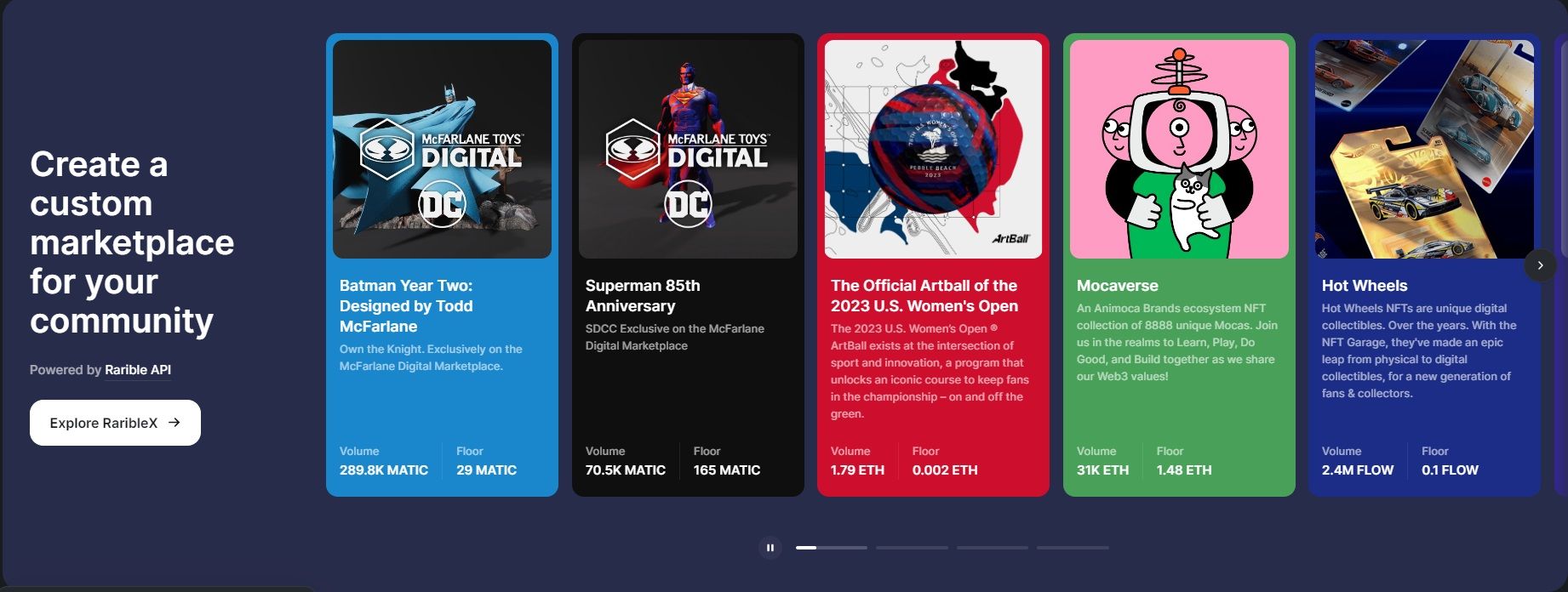 Rarible Operates On a Decentralized Model. Image via Rarible
Rarible Operates On a Decentralized Model. Image via RaribleBlockchain(s): Ethereum, Polygon, Immutable and more.
Crypto(s) Accepted: ETH and selective ERC20 tokens, RARI ETH, MATIC, IMX, CELO and GLMR.
Fees: Rarible has a tiered fee structure. It charges 7.5% per each side (the buyer and the seller) for sales of $0 to $100. For transactions topping $4,000, it charges 0.5% per each side.
Royalties: Artists can set their own royalties.
Key Features
- Minting Made Easy: Users can easily mint their own NFTs directly on the platform. The straightforward minting process lowers the barrier to entry for creators, enabling artists, musicians, and other creators to tokenize their work without needing advanced technical knowledge.
- RARI Chain: RARI Chain is a performant EVM-equivalent blockchain powered by Arbitrum. It boasts low costs, fast transaction times, and enables creators to embed royalties on the node level.
- Drops: A drop refers to a newly released collection of NFTs. It often includes an "allowlist" of selected individuals who get early access and information about the NFTs before the general public. By using the drop feature on Rarible, you essentially become part of this exclusive allowlist, giving you access to limited edition items.
SuperRare
SuperRare is a premier NFT marketplace dedicated to high-quality digital art. Founded in 2018, it offers a curated platform where artists and collectors can buy, sell, and trade unique, one-of-a-kind artworks. SuperRare emphasizes exclusivity and authenticity, ensuring that each piece listed is original and truly rare.
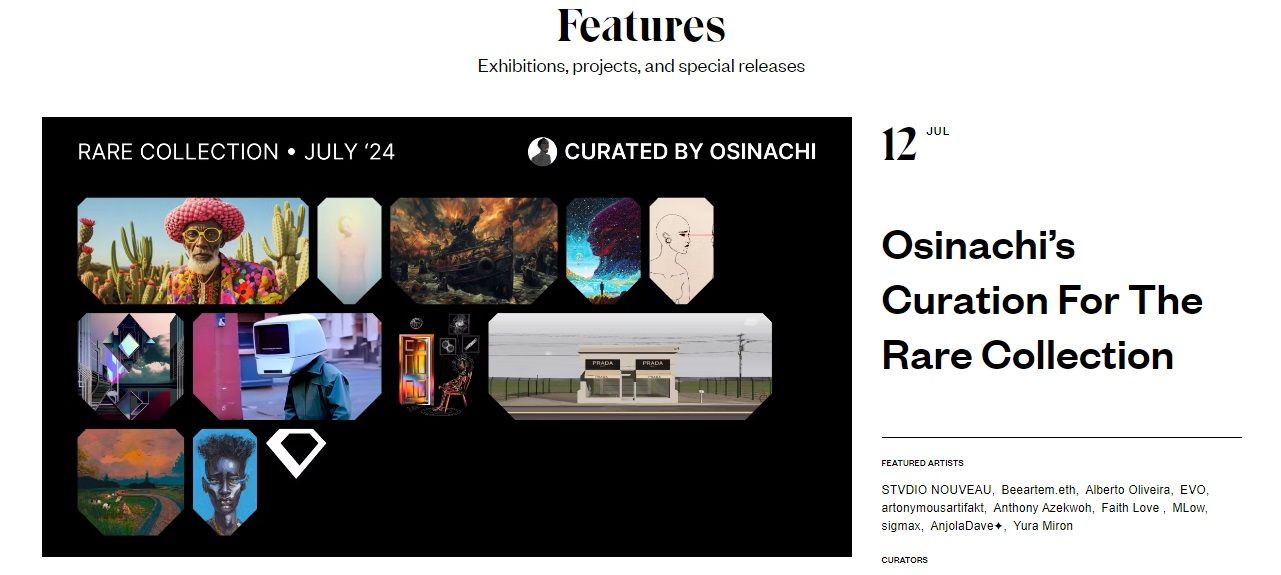 SuperRare Emphasizes Exclusivity and Authenticity. Image via SuperRare
SuperRare Emphasizes Exclusivity and Authenticity. Image via SuperRare
Blockchain(s): Ethereum
Crypto(s) Accepted: ETH
Fees: 15% on primary sales. In addition, there's a 3% marketplace fee added on top of the sale price that's paid for by the buyer.
Royalties: 10% on secondary sales
Key Features
- Curated Art: SuperRare prides itself on featuring high-quality, unique digital art. Each artist is carefully selected to maintain the platform’s standard of excellence, making it a go-to destination for serious art collectors.
- RARE Token: This is the SuperRare governance and curation token with initial distribution made to early adopters of SuperRare.
- Rare Protocol: Hosted on rare.xyz, Rare Protocol allows you to support and share in the success of your favorite artists through “curation staking.”
In addition to these features, SuperRare offers robust tools for both artists and collectors, such as detailed analytics and insights on artworks and market trends. Its website, however, can be a handful to navigate and is a bit heavy. The help centre has a lot of useful information for details. The “About” section link came out empty, showing some sloppy website management.
Foundation
Launched in early 2021, Foundation is an exclusive NFT marketplace known for its focus on high-quality digital art and unique creator experiences.
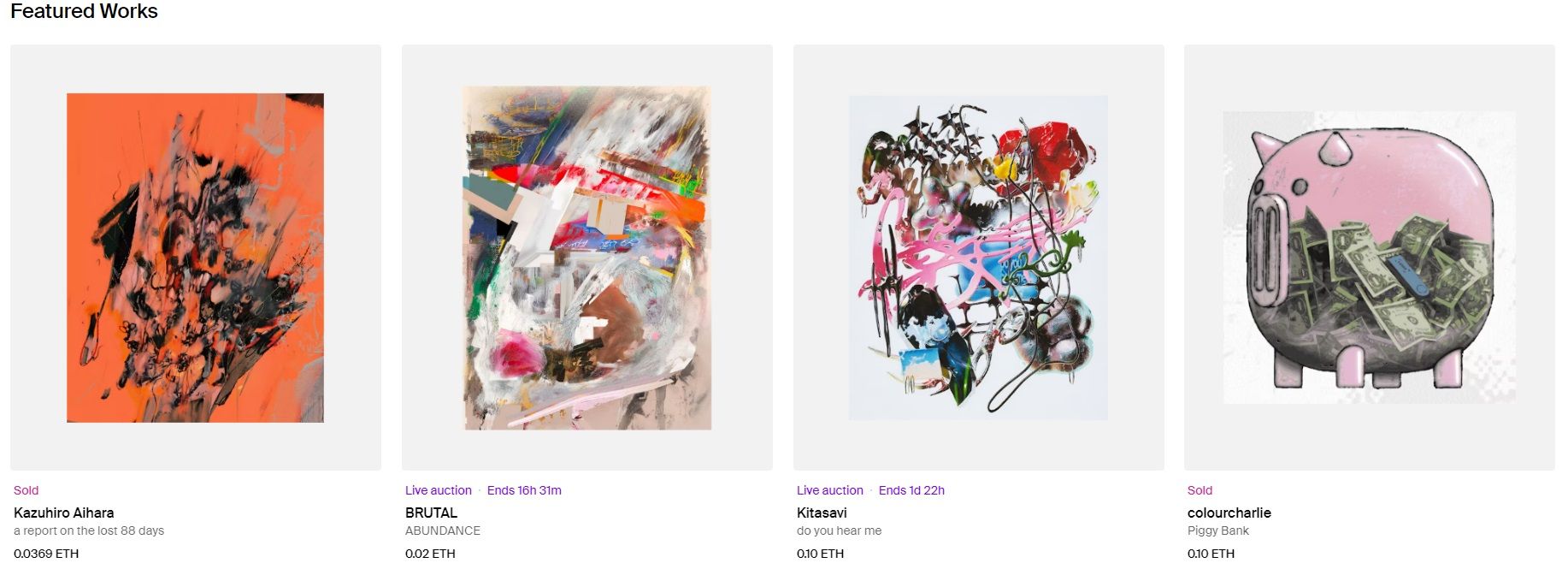 Foundation Places a Strong Emphasis on Supporting Creators. Image via Foundation.
Foundation Places a Strong Emphasis on Supporting Creators. Image via Foundation.Blockchain(s): Ethereum
Crypto(s) Accepted: ETH
Fees: 5% fee for primary and secondary sales that use auctions, offers or buy now.
Royalties: 10% on secondary sales
Key Features
- Curated Art: Foundation features a carefully curated selection of digital artworks, ensuring that each piece meets high artistic standards.
- Creator-Centric: Foundation places a strong emphasis on supporting creators. Artists are invited to join the platform through a community-led process, where existing members can invite new artists. This invitation system ensures that only talented and serious creators become part of the community.
- Innovative Auction System: The platform employs a unique auction system where artworks are sold through timed auctions. This approach creates excitement and competition among collectors, often leading to higher sale prices for artists.
Foundation's commitment to quality, innovation, and community makes it a standout in the NFT space. It offers a refined and engaging environment for discovering and collecting digital art. Most importantly, it has a simple but neat website, and a fantastic helpcenter to answer almost all your queries.
Nifty Gateway Studio
Nifty Gateway Studio is a prominent NFT marketplace known for its collaboration with high-profile artists and brands. Founded in 2018 by Duncan and Griffin Cock Foster, and acquired by the Winklevoss twins in 2019, the platform aims to make NFTs accessible to mainstream audiences.
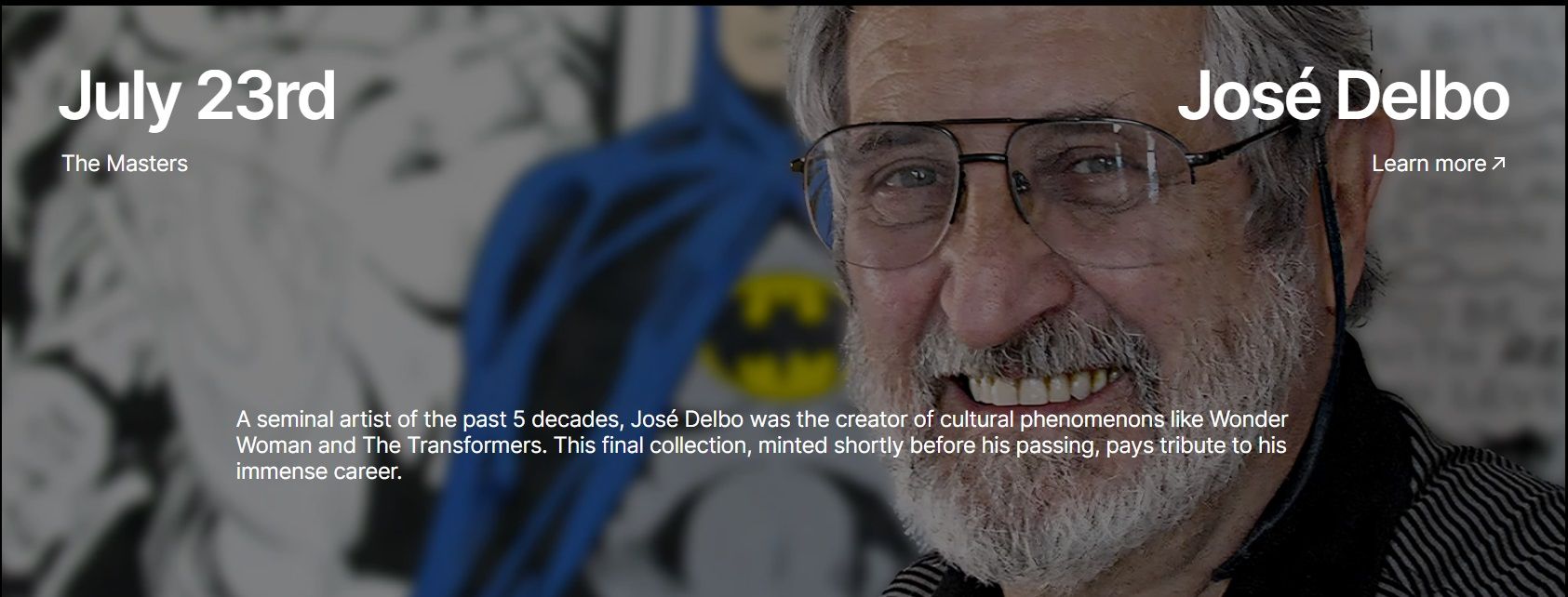 Nifty Gateway Studio is Known For Collaborating With High-Profile Artists and Brands. Image via Nifty Gateway Studio
Nifty Gateway Studio is Known For Collaborating With High-Profile Artists and Brands. Image via Nifty Gateway StudioBlockchain(s): Ethereum
Crypto(s) Accepted: ETH
Fees: V1 listings: 5%; V2 listings: 2.5%
Royalties: Artists set their own royalties
Key Features:
- Exclusive Drops: Nifty Gateway is renowned for its "drops," where digital artworks and collectibles are released in limited quantities at scheduled times. These drops often feature collaborations with well-known artists and celebrities, creating significant buzz and demand.
- User-Friendly Platform: The marketplace is designed to be accessible for both novice and experienced users. It allows purchases using credit cards, simplifying the process of acquiring NFTs without the need for cryptocurrency. Users also have the ability to connect their Gemini accounts for seamless payments and cashouts.
- Custodial Wallet System: Nifty Gateway uses a custodial wallet system, meaning the platform manages the private keys for users. This approach offers convenience and reduces the risk of losing access to NFTs due to lost keys.
- No Gas Fees: Unlike other web3 providers, Nifty Gateway Studio has no gas fees, and flexible payment options like debit card, credit card, Gemini Balance, Apple Pay, Google Pay, and Buy Now Pay Later, in addition to crypto.
- Security: Backed by parent company Gemini, the marketplace offers a secure infrastructure that is SOC1 Type 2 and SOC 2 Type 2 certified, in addition to 2FA on every account.
Nifty Gateway’s website is smooth to navigate, but its helpcenter could be refined a bit more for at least clear basic information like fees and charges.
Mintable
Mintable is a dynamic NFT marketplace designed to cater to both creators and collectors, offering a variety of tools and features to simplify the NFT creation and trading process.
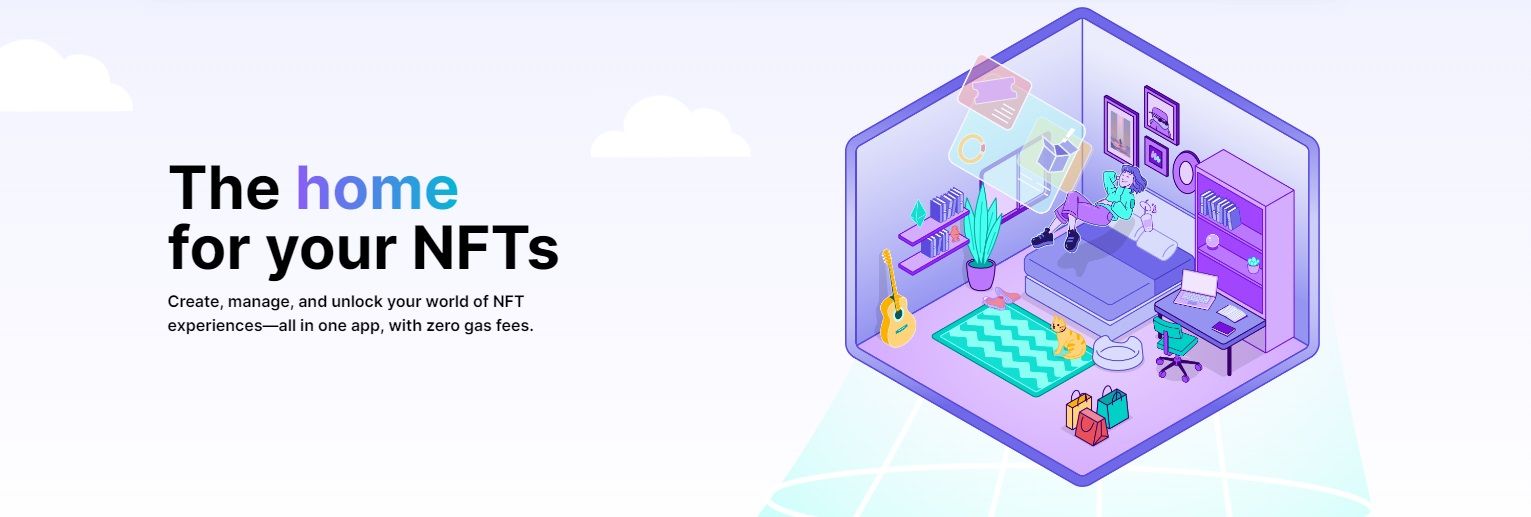 Users Can Mint Their NFTs With Just a Few Clicks. Image via Mintable
Users Can Mint Their NFTs With Just a Few Clicks. Image via MintableBlockchain(s): Ethereum, Immutable X and Ripple
Crypto(s) Accepted: ETH
Fees: 2.5%
Royalties: Artists can set their own royalties. 10% on secondary sales
Key Features
- Easy Minting Process: Mintable offers a streamlined process for creating NFTs. Users can mint their NFTs with just a few clicks, without needing any coding skills. The platform supports both gasless minting on Ethereum and traditional minting, providing flexibility for users.
- Marketplace for Various Assets: Mintable supports a wide range of digital assets, including art, music, videos, and more.
- Gasless Minting: One of Mintable's standout features is its gasless minting option. This allows users to create NFTs without paying upfront gas fees, lowering the barrier to entry for new creators.
- Customizable Storefronts: Creators can set up their own customizable storefronts, making it easier to brand and sell their digital products.
- Robust Security: The platform employs strong security measures to protect users' digital assets and transactions. Regular audits and secure payment gateways ensure a safe trading environment.
Portion
Portion is a decentralized NFT marketplace that connects artists and collectors, enabling them to create, sell, and trade digital art and collectibles seamlessly. Established in 2018, Portion leverages blockchain technology to ensure transparency and fairness in the digital art market.
 Portion's Puzzling Website Could Have Been Less Dramatic. Image via Portion
Portion's Puzzling Website Could Have Been Less Dramatic. Image via PortionBlockchain(s): Ethereum
Crypto(s) Accepted: ETH
Fees: Artists are charged 0% fees on primary sales
Royalties: Artists earn 11% on secondary sales
Key Features
- Diverse Digital Assets: The platform hosts a variety of digital assets, including art, music, and collectibles, providing a rich and diverse marketplace for creators and collectors.
- Royalties for Artists: Portion supports artist royalties, allowing creators to earn a percentage of each secondary sale of their work. This feature ensures ongoing income for artists as their creations continue to be traded.
- Integration with Ethereum: The platform integrates with the Ethereum blockchain, ensuring secure and verifiable transactions.
Portion is another good option in the NFT marketplace space. However, their puzzling website could have been less dramatic. Users would rather focus on the marketplace than a free digital trip to “Portionland."
KnownOrigin
KnownOrigin is a premier NFT marketplace designed to connect artists and collectors, facilitating the creation, sale, and trading of unique digital collectibles. The platform emphasizes transparency and security.
 A Premier NFT Marketplace Designed to Connect Artists and Collectors. Image via KnownOrigin
A Premier NFT Marketplace Designed to Connect Artists and Collectors. Image via KnownOriginBlockchain(s): Ethereum
Crypto(s) Accepted: ETH
Fees: 15% platform fee on primary sales: 2.5% on Secondary Sales
Royalties: Artists earn 12.5% on secondary sales.
Key Features:
- Curated Art: KnownOrigin features a curated selection of high-quality digital art, ensuring that each piece meets specific artistic standards.
- Creator Support: Artists can mint, list, and sell their original works through KnownOrigin's platform, with a strong emphasis on maintaining ownership and earning royalties from secondary sales.
How to Buy NFTs
Buying NFTs can seem daunting at first, but with the right steps, you can easily dive into the world of digital collectibles and art. Here's a step-by-step guide to help you get started:
1. Setting Up a Digital Wallet
- Choose a Wallet: To store your NFTs and cryptocurrencies, you'll need a digital wallet. Popular options include MetaMask, Coinbase Wallet and Crypto.com DeFi Wallet.
- Create an Account: Follow the wallet provider's instructions to set up your account. This usually involves downloading the wallet app, creating a secure password, and safely storing your recovery phrase.
- Connect to an Exchange: Link your wallet to a cryptocurrency exchange like Coinbase or Binance to purchase cryptocurrencies such as Ethereum (ETH), which is commonly used for buying NFTs.
2. Browsing and Selecting NFTs
- Choose a Marketplace: Decide which NFT marketplace to use. OpenSea, Rarible, and Foundation are popular options. Sign up for an account if required.
- Explore NFTs: Browse the marketplace to find NFTs that interest you. Use filters to narrow down your search by category, price, or creator.
- Review Details: Check the details of the NFT, including its creator, ownership history, and any attached metadata. Make sure to verify its authenticity and the credibility of the creator.
3. Completing the Purchase Process
- Bid or Buy Now: Depending on the marketplace, you can either place a bid on an NFT or purchase it outright. Some platforms operate on an auction system, while others offer fixed prices.
- Confirm Payment: When you're ready to buy, ensure your wallet has enough cryptocurrency to cover the purchase price and any associated gas fees. Follow the prompts to confirm the transaction.
- Secure Your NFT: Once the transaction is complete, the NFT will be transferred to your digital wallet. You can view your new asset in your wallet or on your profile page within the marketplace.
Additional Tips
- Research and Stay Informed: Before making any purchases, research the NFT and its creator. Staying informed about market trends and popular collections can help you make better investment decisions.
- Be Aware of Gas Fees: Gas fees can vary greatly depending on the blockchain network's activity. Plan your purchases when fees are lower to save money.
- Secure Your Wallet: Protect your digital wallet by using strong passwords, enabling two-factor authentication, and keeping your recovery phrase private.
How to Sell NFTs
Selling NFTs involves a few essential steps to ensure you successfully list and manage your digital assets. Here’s a guide to help you navigate the process:
1. Creating and Minting NFTs
- Choose a Platform: Select an NFT marketplace that supports the creation and sale of NFTs, such as OpenSea.
- Mint Your NFT: Upload your digital file (art, music, video, etc.) to the platform. Fill in the necessary details like title, description, and any attributes. Choose whether you want to mint the NFT immediately or set it up as a listing that mints upon purchase. Ensure you have enough cryptocurrency to cover minting fees, typically paid in ETH on platforms like OpenSea.
2. Listing NFTs for Sale
- Set Pricing: Decide on the pricing method for your NFT. Options include fixed price, auction, or declining price listings. Each method has its advantages depending on your sales strategy and market demand.
- Add Details: Provide a detailed description and relevant tags to make your NFT discoverable. High-quality visuals and a compelling story can attract potential buyers.
- Complete the Listing: Confirm the listing details and pay any required gas fees. Your NFT is now live on the marketplace for potential buyers to discover.
3. Managing Sales and Transactions
- Monitor Listings: Keep an eye on your listings and respond to any offers or bids. Engaging with potential buyers can help close sales.
- Transfer Ownership: Once a sale is complete, the NFT is transferred automatically to the buyer’s wallet, and the payment is deposited into your account. Ensure your wallet is properly connected to receive funds.
- Promote Your NFTs: Share your listings on social media and within NFT communities to increase visibility and attract more buyers.
Additional Tips
- Understand Royalties: Most platforms allow you to set royalties, ensuring you earn a percentage from future resales of your NFT. This can provide a steady income stream as your work gains popularity.
- Secure Your Digital Wallet: Protect your earnings and NFTs by using strong passwords, enabling two-factor authentication, and keeping your private keys safe.
Top NFT Marketplaces: Closing Thoughts
Navigating the world of NFTs can be both exhilarating and overwhelming, but understanding the key marketplaces and their unique features can make your journey smoother.
From the expansive selection on OpenSea and the community-driven approach of Rarible to the exclusive, high-quality art on SuperRare and Foundation, each platform offers distinct advantages tailored to different needs. When choosing a marketplace, consider the user interface, transaction fees, security measures, supported cryptocurrencies, and the platform’s reputation.
All in all, NFT marketplaces are transforming how we perceive and interact with digital assets, democratizing access and fostering innovation. By leveraging the features and tools of these platforms, you can better explore the dynamic world of NFTs with confidence.





